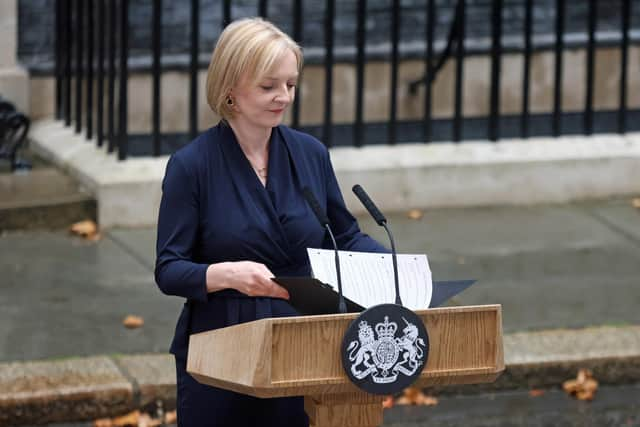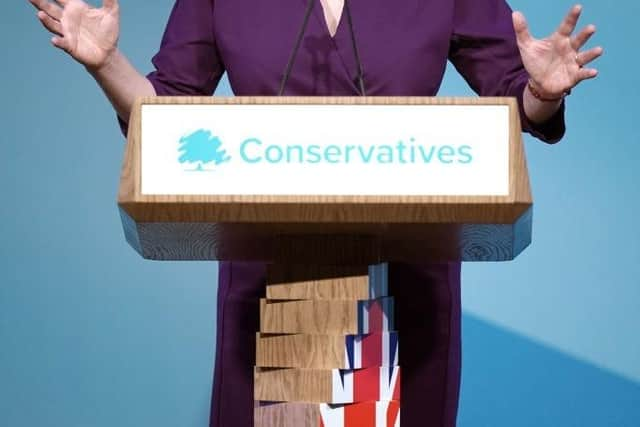Indyref: Truss's proposals are a gift to the SNP - Martyn McLaughlin
Even before news of her premiership was made official, briefings and whispers hinted at a major shake up of any future referendum on Scottish independence. The next vote over whether Scotland leaves the UK, it has been suggested, will only be held once 60 cent of Scots express prolonged support for a referendum, and even then, independence would require the support of more than 50 per cent of the electorate, as opposed to a simple majority - an unprecedented figure seemingly rolled out in service of a desperate urge to settle the issue indefinitely.
Understandably, the proposition, which bears all the fingerprints of the Scottish secretary, Alister Jack, has focused the minds of nationalists on the constitutional aberration otherwise known as the 1979 devolution referendum. It remains the only referendum since 1975 in which a Yes vote did not result in the implementation of the proposal put to the people.
Advertisement
Hide AdAdvertisement
Hide AdBack then, the Labour MP, George Cunningham, spurred on by Robin Cook and Tam Dalyell, successfully presented an amendment to the Scotland Act 1978 which required 40 per cent of the eligible electorate to vote for a Scottish Assembly.
It remains to be seen if, or when, Ms Truss intends to flesh out suggestions of a new, even steeper turnout threshold, and whether the necessary legislation is dependent on the outcome of next month’s Supreme Court hearing on the Scottish Government’s plans for a new referendum.
Either way, it is a calamitous and undemocratic idea which, if implemented, will only expedite independence. Save for her cosplay Thatcherism, the new Prime Minister appears to have scant regard for history. Otherwise she would have heeded the lessons of 1979, and the warnings of Dalyell and others.
At the Commons debate in January 1978 to vote on Cunningham’s amendment, Dalyell, then vice-chair of the Labour Vote No campaign, pointed out that in the US legislature, a two-third majority was required in both the Congress and the Senate to amend the constitution.
“We are deciding, on the basis of wafer thin parliamentary majorities and great divisions in public opinion, lasting matters in a way in which few other countries decide their constitutional arrangements,” he argued.


Despite the protestations of Jim Sillars and others, Cunningham’s provision stuck. Although the Yes campaign secured a 51.6 per cent majority, it represented just 32.9 per cent of the registered electorate as a whole. This newspaper declared it was tantamount to a “rigged election.”
The repercussions of that referendum are notorious – the repeal of the Scotland Act, the end of Jim Callaghan, and the beginning of 18 years of Conservative rule. But it also shaped support for and against independence for decades to come. Arguably, its impact is still being felt today.
Dalyell later expressed regret over the imposition of the contentious 40 per cent hurdle, and made an interesting observation; not only had it denied victory to the Yes campaign, but it impacted on support for the No side.
Advertisement
Hide AdAdvertisement
Hide Ad

“Undoubtedly it cost the campaign votes,” he wrote in his 2011 autobiography. “How many votes, none of us will ever know. But, in my opinion, it was enough to have given the ‘No’ campaign outright victory in the popular vote.”
Ms Truss may not have given it much thought, but it is a wonder that no one among her band of loyalists has pointed out that a turnout threshold would be doubly damaging this time around.
The idea that is being run up the flagpole is as naive as it is reckless. It not only negates the long-held unionist position that there should not be another referendum for the foreseeable future; it betrays the paucity of ideas wielded by her incoming administration.
Does she intend to win hearts and minds so as to revitalise and reinforce the union through consent, or will she weld its creaking parts together by the force of law?
Leaving aside the issue of an arbitrary figure with which to confer legitimacy, and the obvious point that such a check was deemed unnecessary for the era-defining Brexit vote, there are grave practical concerns over such a plan. Back in 1979, there was uproar over adjustments to the electoral register which failed to discount those who were double-registered, hospitalised, or otherwise unable to vote, which put the Yes campaign at an even greater disadvantage.
What possible confidence can we have in the electoral register today? Only three years ago, a study by the Electoral Commission found that 17 per cent of eligible voters were not correctly registered at their current address, representing as many as 9.4 million people. As many as 11 per cent of the register entries were inaccurate, affecting up to 5.6 million people.
At a time of growing distrust in the legitimacy of democratic institutions and the political process, this is not the basis by which to achieve a fair and decisive outcome.
But more importantly, the condition of a turnout threshold would fatally diminish the crucial debate over Scotland’s constitutional future. Instead of having to set out a compelling argument for the status quo, supporters of the union would need only to convince people to stay at home. This is an issue too important to be decided by apathy.
Advertisement
Hide AdAdvertisement
Hide AdMaybe this is the limit of the ambitions of Britain’s new prime minister, a drab opportunist devoid of any purpose or principles, who seems oblivious to the discord and anger across the country she purports to unite.
If Ms Truss loads the dice in her dealings with Scotland, she will do more to advance the cause of independence than any of her predecessors since Thatcher. There is part of me that wonders whether that will only encourage her. A perverse thought, perhaps, but we live in perverse times.
Comments
Want to join the conversation? Please or to comment on this article.
